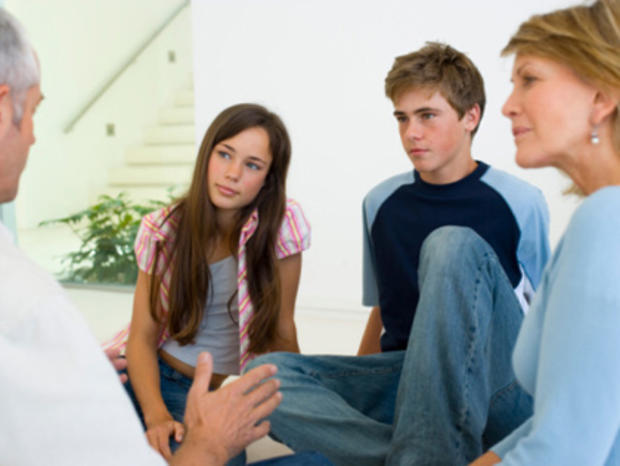Talking To Your Kids About Bullying
Kids face all types academic and social challenges in school. Being the victim of a relentless bully can be a distraction and even a danger to kids. As a parent, it is important to recognize the signs of bullying, know how to talk to your children about bullies and establish an appropriate reaction to a bully situation.
Jodie Miller, a sixth grade teacher, often coaches her students through bullying problems. Open to all reports of bullying and taking each child seriously, she has a continual conversation with her students about what bullying is. Ms. Miller asks students reflective questions such as, "Are they bugging you or bullying you?" She considers whether "a child's emotional and/or physical well being is in jeopardy." Another regard; "Is the incident happening over a period of time or is one kid having a bad day?" She also stresses, "The need to talk to your intermediate/pre-teen child consistently is imperative."
Bullying identifiers and warning signs.
In between bugging and bullying lies teasing. This is one of the most difficult areas for teachers and parents to identify. Children tease, joke around and try to make one another laugh, especially boys. It is a way in which they connect. However, if your child is consistently feeling "picked on" at school, in your neighborhood or even at home, an adult needs to intervene.
Sometimes children do not report bullying, making it even more difficult to identify instances. However, there are warning signs and children sometimes change their normal behavior when being affected by a bully. According to stopbullying.gov, some warning signs include frequent stomach aches, faking illness, change in eating habits, difficulty sleeping, declining grades, loss of interest in schoolwork and friends and self-destructive behavior.
Talking with your kids regularly will help you identify signs of bullying.
Keeping an open flow of communication with your child, even in periods when bullying is not suspected, is very important. Constantly ask about your children's day and encourage more descriptive answers than "it was OK." Having a continual conversation with your children will make you more intuitive and help you identify when something is awry in your children's daily life.
Adults need to take bullying seriously, which proves difficult because they often feel unprepared themselves as to what advice to give. Parents: you need to keep the conversation and your minds constantly open so your children can seek your help when needed. When your children confide in you about being picked on, teased or bullied, they need help. This is not the time to worry if they have problems tolerating "normal" amounts of teasing. Nor is it the time to say they "need to get along" or "fight back." Self esteem will be affected if the bullying continues over a long period, which can easily alter children's behavior.
What are steps to take if your child is in a bullying situation?
If it is happening at school, your first contact should be your children's teacher or counselors. If your children are willing, you should include them. Often times, children who are bullies are themselves bullied at home. Again, check with the school about the best way to approach this problem. Approaching the bully's parents in the school parking lot may only escalate the problem.
Speak to your children about their bullying situation. Maybe there are small measures you both can take to curtail the bully. For example, if the bully is after toys or electronic devices that your children bring to school, don't allow these items any longer. Another good idea is to encourage your children to hang around friends that can be trusted. Walking home is always safer in groups and bullies might be deterred when other children are present.
It is also important to tell your children to stay calm when facing a bully. Bullies thrive on the reaction they get from their victims and any erratic show of emotions may worsen the situation. Be sure they know that it is brave to just walk away.
Cyberbullying
Cyberbullying is a continuous problem for children because it doesn't stop once they leave school. With text messages and social-networking sites, bullies can harass their victims throughout the day and night. It is important to recognize the signs of a cyberbully and be aware of measures you can take as a parent.
According to KidsHealth.org, your child might be if they act anxious or distraught after using the Internet, if they want to discontinue using the Internet or text messages or if they avoid conversations about their Internet and cell phone activities. Kids might be scared that you will take away their cell phone or Internet privileges if they report a cyberbully, so it is important to have an open line of communication and to keep an open mind yourself when dealing with this issue. You always want your children to have confidence that they can talk to you.
As with any bullying issue, consider going to your children's teacher or school administrator with a complaint. Also, block the bully's access to your children's social media pages and cell phone and encourage your youngsters to avoid responding to the bully's taunts.
What to do if your child is the bully.
For many parents, it is hard to accept that your children are teasing someone at school or in your neighborhood. The first thing you should do is question what is sparking this disruptive behavior in your children. This usually begins with an analysis of your home. Some children who are bullies are copying behavior exhibited in their home life. Do your children get bullied by older siblings, neighbors or even parents? Are your children insecure about something? Does it make your children feel stronger when they pick on someone who is perceived as weak or different? These are all questions that a parent of a bully should be asking.
Parents need to make clear that bullying is a serious problem and will not be tolerated. Punishments should be given and they should stick so your children know that this behavior is unacceptable. In addition to punishing bad behavior, good behavior should be praised. Teach your kids the benefits of being kind and helping others. They need to know the meaning of the old adage, "You catch more flies with honey than vinegar."
It is also important to be involved in your children's social life. Be aware of the friends they have and of the pressures they might be facing at school. Sometimes, different social stresses can cause children to act out against their peers. Finally, you should seek help from your children's counselor or teacher to help you gain a greater understanding of the situation and get advice to correct this bad behavior.
Rhonda Cratty has been a teacher, instructional coach and writer since 1983. Rhonda enjoys writing about ways parents can improve the quality of their children's educational lives. She has been the National Parent & Education at Examiner.com since December 2008. Her work can be found on Examiner.com.






